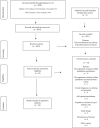Facilitators and barriers for lifestyle change in people with prediabetes: a meta-synthesis of qualitative studies
- PMID: 35313859
- PMCID: PMC8935766
- DOI: 10.1186/s12889-022-12885-8
Facilitators and barriers for lifestyle change in people with prediabetes: a meta-synthesis of qualitative studies
Abstract
Background: The increasing prevalence of type 2 diabetes worldwide is a major global public health concern. Prediabetes is a reversible condition and is seen as the critical phase for the prevention of type 2 diabetes. The aim of this study is to identify and synthesize current evidence on the perceived barriers and facilitators of lifestyle change among people with prediabetes in terms of both initial change and lifestyle change maintenance.
Methods: A systematic literature search in six bibliographic databases was conducted in April 2021. Potential studies were assessed for eligibility based on pre-set criteria. Quality appraisal was done on the included studies, and the thematic synthesis approach was applied to synthesize and analyse the data from the included studies.
Results: Twenty primary studies were included, containing the experiences of 552 individuals. Thirteen studies reported participants perceived facilitators and barriers of lifestyle change when taking part in community-based lifestyle intervention programs, while seven studies reported on perceived facilitators and barriers of lifestyle change through consultations with health care professionals (no intervention involved). Three analytical themes illuminating perceived barriers and facilitators for lifestyle change were identified: 1) the individual's evaluation of the importance of initiating lifestyle change, 2) the second theme was strategies and coping mechanisms for maintaining lifestyle changes and 3) the last theme was the significance of supportive relations and environments in initiating and maintaining lifestyle change.
Conclusion: Awareness of prediabetes and the perception of its related risks affects the motivation for lifestyle change in people at risk of type 2 diabetes; but this does not necessarily lead to lifestyle changes. Facilitators and barriers of lifestyle change are found to be in a complex interplay within multiple ecological levels, including the interpersonal, intrapersonal, environmental and policy level. An integrated understanding and analysis of the perceived barriers and facilitators of lifestyle change might inform people with prediabetes, healthcare professionals, and policy makers in terms of the need for psychological, social, and environmental support for this population.
Keywords: Ecological model; Intrinsic motivation; Lifestyle change; Maintenance; Prediabetes; Risk perception; Self-determination; Self-regulation.
© 2022. The Author(s).
Conflict of interest statement
The authors declare that there are no competing interests.
Figures
Similar articles
-
Barriers and facilitators of self-care in adults with pre-diabetes: a directed qualitative content analysis.BMC Health Serv Res. 2025 Mar 4;25(1):332. doi: 10.1186/s12913-025-12407-3. BMC Health Serv Res. 2025. PMID: 40033296 Free PMC article.
-
Individual, healthcare professional and system-level barriers and facilitators to initiation and adherence to injectable therapies for type 2 diabetes: A systematic review and meta-ethnography.Diabet Med. 2022 Jan;39(1):e14678. doi: 10.1111/dme.14678. Epub 2021 Sep 3. Diabet Med. 2022. PMID: 34432914
-
A qualitative exploration of facilitators and barriers to adopting a healthy lifestyle among Black, Hispanic, and American Indian males with diabetes or at risk for type 2 diabetes.Ethn Health. 2024 May-Jul;29(4-5):447-464. doi: 10.1080/13557858.2024.2359377. Epub 2024 Jun 6. Ethn Health. 2024. PMID: 38842432
-
Beyond the black stump: rapid reviews of health research issues affecting regional, rural and remote Australia.Med J Aust. 2020 Dec;213 Suppl 11:S3-S32.e1. doi: 10.5694/mja2.50881. Med J Aust. 2020. PMID: 33314144
-
Effects of lifestyle changes on adults with prediabetes: A systematic review and meta-analysis.Prim Care Diabetes. 2018 Oct;12(5):393-408. doi: 10.1016/j.pcd.2018.07.003. Epub 2018 Aug 1. Prim Care Diabetes. 2018. PMID: 30076075
Cited by
-
Adults' perceived health promotion needs in the prediabetes stage: a meta-synthesis study.J Prev Med Hyg. 2024 Jan 1;64(4):E411-E428. doi: 10.15167/2421-4248/jpmh2023.64.4.3152. eCollection 2023 Dec. J Prev Med Hyg. 2024. PMID: 38379738 Free PMC article.
-
Risk perception and its predictors towards type 2 diabetes mellitus among students in Universiti Kebangsaan Malaysia.Medicine (Baltimore). 2023 Oct 27;102(43):e35520. doi: 10.1097/MD.0000000000035520. Medicine (Baltimore). 2023. PMID: 37904385 Free PMC article.
-
Using the Translating Research into Practice framework to develop a diabetes prevention intervention in primary care: a mixed-methods study.BMJ Open Qual. 2024 Jun 5;13(2):e002752. doi: 10.1136/bmjoq-2024-002752. BMJ Open Qual. 2024. PMID: 38839396 Free PMC article.
-
Cost saving analysis of prediabetes intervention modalities in comparison with inaction using Markov state transition model-A multiregional case study.J Diabetes. 2024 May;16(5):e13553. doi: 10.1111/1753-0407.13553. J Diabetes. 2024. PMID: 38664882 Free PMC article.
-
Barriers and facilitators of self-care in adults with pre-diabetes: a directed qualitative content analysis.BMC Health Serv Res. 2025 Mar 4;25(1):332. doi: 10.1186/s12913-025-12407-3. BMC Health Serv Res. 2025. PMID: 40033296 Free PMC article.
References
-
- Saeedi P, Petersohn I, Salpea P, Malanda B, Karuranga S, Unwin N, et al. Global and regional diabetes prevalence estimates for 2019 and projections for 2030 and 2045: Results from the International Diabetes Federation Diabetes Atlas, 9th ed. Diabetes Res Clin Pract. 2019;157:107843. - PubMed
Publication types
MeSH terms
LinkOut - more resources
Full Text Sources
Medical
Miscellaneous



